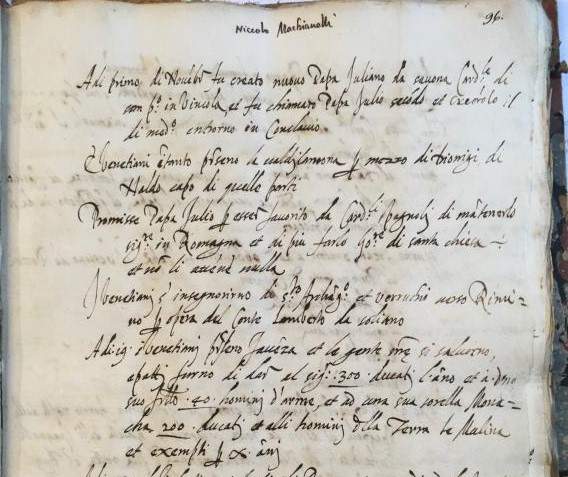An unpublished text by Niccolò Machiavelli (Florence, 1469 - 1527), the great historian and political philosopher and a central figure of the Renaissance, has been discovered at the National Central Library in Florence. The discovery occurred as part of a cataloging project of the Manuscripts and Rare sector of the BNCF, and specifically during some operations for the PAL-MO project. The BNCF’s Palatino fund in Manus OnLine, promoted by director Luca Bellingeri and conceived by David Speranzi, head of the Manuscripts and Rare Sector, Daniele Conti: moreover, this is the same project that had led, last February, to the discovery of an unpublished text, accompanied by a drawing, by Francesco Guicciardini.
The new discovery, described as “exceptional” by the Library, came after the consultation of a codex summarily inventoried as Cronica and never opened in recent decades: inside it were preserved several Historical Fragments attributable to Machiavelli and hitherto unknown. The texts discovered are placed in a period from 1497 to 1515 and include accounts of some important events in the history of those years, such as the Battle of Marignano or the death of Cesare Borgia, known as the Valentino, the protagonist of Chapter VII of The Prince, one of Machiavelli’s masterpieces. The texts were not written by Machiavelli himself, but by someone who transcribed his originals: the task is thought to have been carried out by a copyist workshop that had been commissioned by Giuliano de’ Ricci, Machiavelli’s nephew, that is, the son of his daughter Bartolomea. Ricci, Machiavelli’s heir, collected his papers at his grandfather’s behest, gathering them into a codex known as the “Apografo Ricci,” preserved in the BNCF’s Palatino collection.
The attribution to Machiavelli has been formulated on the basis of much philological evidence (including the annotations of Giuliano de’ Ricci himself, who in the first sheet of the two fascicles containing the unpublished papers wrote his grandfather’s name in his own hand), paleographical evidence (e.g., the comparison between the hands that penned the Historical Fragments and those that copied the texts of the Apograph Ricci: of the three hands of the unpublished texts, one coincides with the Apograph’s handwriting) and historical (e.g., the type of binding similar to that of other volumes containing certain Machiavellian texts), which will be discussed in a forthcoming study completed by Daniele Conti and sponsored by the BNCF. The essay will be published in the Incipit series of the Scuola Normale Superiore di Pisa. Meanwhile, the new Machiavellian manuscript will be the focus of a presentation organized at BNCF on the occasion of Paper Sunday (Oct. 11, 2020): the director, Luca Bellingeri, David Speranzi, Daniele Conti, and two eminent Machiavelli scholars, Francesco Bausi and Michele Ciliberto, will speak.
“The discovery of these completely unknown Machiavellian pages,” the Library notes, “confirms that the systematic cataloging of the immense manuscript heritage of Italian State Libraries can still reveal the existence of priceless treasures.” And it stresses the urgency of investing more and with more conviction in libraries, which are too often left further behind than others.
Pictured is one of the unpublished papers.
 |
| Florence, exceptional discovery: found some unpublished texts by Machiavelli |
Warning: the translation into English of the original Italian article was created using automatic tools. We undertake to review all articles, but we do not guarantee the total absence of inaccuracies in the translation due to the program. You can find the original by clicking on the ITA button. If you find any mistake,please contact us.